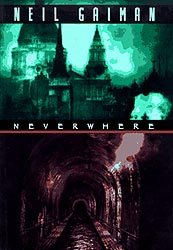 Neverwhere by Neil Gaiman (1996)
Neverwhere by Neil Gaiman (1996)What if one day you wake up and find out that you have been practically erased from the world you know?
People ignore you, your fiancee doesn’t recognize you, your office has been removed, and your apartment has been rented out to someone else. Moreover, you are categorically broke. To make matters worse, you are forced to live in a world you never knew existed — a world full of bizarre contradictions and anachronisms and inhabited by eerie characters who seem to be products of a hyper-active imagination and who, in all probability, would contribute to your creeping insanity.
Your only chance to regain the life that you lost is to embark on a dizzying and potentially disastrous journey to help someone from this underground solve the mystery of her parents’ murder— a dangerous quest which, in all indications, might simply lead to your utter demise.
Such is the plot behind Neil Gaiman’s 1996 novel Neverwhere.
It is the story of Richard Mayhew, an average guy with a dull job, an independent and overly demanding (but beautiful) fiancee and an uneventful therefore boring life. While walking with his fiancee Jessica one night, Richard finds Lady Door sprawled on the sidewalk — bleeding and apparently dying. He helps her, much to Jessica’s dismay, takes her home and takes care of her.
From then on, his life is never the same again.
In Neverwhere, Gaiman takes us to a dark and magical world of nobility, honor, deceit, and incongruities. The plot may be your usual fare in fantasy novels, but the way Gaiman develops it — weaving vivid details over, above, and under oftentimes menacing and depressing but sometimes ridiculous and humorous situations — makes the plot seem fresh and unrehashed.
Another strong point of this ten-year-old novel is the presence of lovable and hateful characters that grow on you as you turn each page. Gaiman’s brilliant unfolding of the different personalities that inhabit London Below keeps you guessing as to the real motives of each, and this makes for an exciting read. You actually find yourself reserving your judgment of a character until after you’ve learned of his or her real intentions. Oftentimes, however, it is too late.
One may actually figure out from the start how the novel will end. As far as fantasy novels go, a happy ending is almost always expected. However, following how one gets there is the biggest part of the fun.
I find that Richard’s life’s crucial turn serves as a metaphor for our own fragile lives which may invariably turn at any direction in one misstep. There are times when we are made to live a parallel existence amid people who used to be among us but who suddenly begin to act like we no longer exist. We then live among strange new acquaintances that we begin to start loving or despising.
I never used to be a fantasy reader. I have always preferred the innate plausibility of realistic fiction. Nevertheless, I highly recommend the book to young readers, even to those who are not really into the fantasy genre. I must say that the novel is brilliant in its simplicity. Tolkien fans might consider the book wanting in description and elaboration. Tolkien is, after all, the acknowledged master of the genre. However, I feel that it is actually the simple elegance of Gaiman’s storytelling which proves to be the book’s appeal.
I have never been to London. This is most probably the reason why I found the journey to London Below sufficiently awe-inspiring. Neverwhere took me to places I have never seen and, in all likelihood, might never ever see. Neverwhere, after all, is never really anywhere.
Note: This is the third Gaiman book that I've read so far. The others are American Gods (which I enjoyed immensely) and Anansi Boys, his latest. Suffice it to say, I enjoyed reading all of them. I recently bought Coraline and am currently looking for his collaboration with Terry Pratchett (of Discworld fame) entitled Good Omens.
3 comments:
You were at rockwell yesterday. >:)
And sadly, I have this book but I haven't had sufficient time to finish it.
they recently released a hardcover edition of "good omens", but the only bookstore that has it (to my knowledge, anyway) is fully booked.
while there are older paperback versions of the novel, it's best to buy the hardover one because it has the least amount of errors. :)
Yes, I saw the hardcover edition of Good Omens in Fully Booked-Rockwell, but I didn't have the money to buy it then. When I came back for it, it was already out of stock. Darn.
Post a Comment